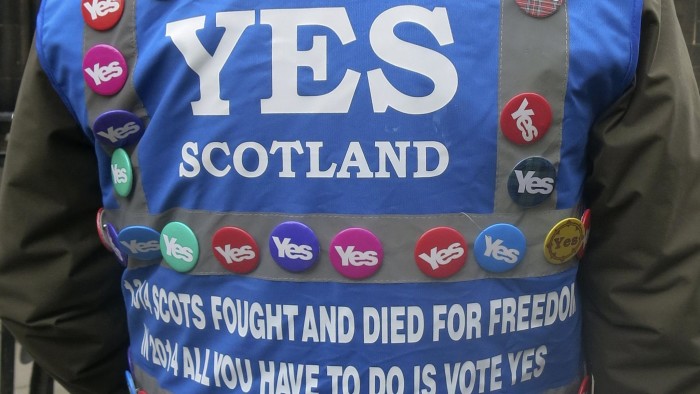Salmond falls far short on certainty

Roula Khalaf, Editor of the FT, selects her favourite stories in this weekly newsletter.
Political campaigns are often defined by whether they try to convince voters on the merits of change or continuity. However, in this as in many other respects, the battle over Scottish independence, now in its final weeks before the referendum on September 18, has revealed much more than politics as usual. Alex Salmond, leader of the Scottish National party, argues that a vote for independence is a vote for “ambition” yet also for “certainty”, the way to keep Scotland the way Scots like it.
The National Health Service is the latest example of how Mr Salmond has tried to present the SNP, the vanguard of the pro-independence campaign, as a source of stability. He claims that a Yes vote is the only way to protect the NHS in Scotland from spending cuts and privatisation led by the UK government. Never mind that Edinburgh’s devolved parliament already controls all health policy north of the border and that health spending is one of the areas spared the worst of Britain’s austerity.
Mr Salmond’s motives are clear. Voters stirred by romantic sirens – secessionist or unionist – have made up their minds. Those Scots who remain persuadable are, campaign strategists say, left-leaning pragmatists who worry about the consequences of independence for public services and the economy. They may not like the SNP, they may find Mr Salmond a smarty-pants – but they revere the NHS.
They are also voters who would perhaps prefer it if devolution were on the ballot next month, rather than the bracing question: “Should Scotland be an independent country?” Further devolution is the constitutional future favoured by a plurality of Scots. Autonomy short of independence is the campaign’s phantom limb. It is why the SNP is keen to reassure. It also explains why Alistair Darling, the head of the Better Together side,whom Mr Salmond debates for the second time on television on Monday, stresses that Scotland will have more power even in the case of a No vote.
The lack of a clear majority for independence as an end in itself means the SNP’s desire to secede can at times seem halfhearted and riddled with ironies. For Scottish nationalists they are fond of keeping British institutions such as the BBC, the NHS, the monarchy and the pound. For a left-leaning party, the SNP can be a conservative defender of the status quo. And for a heavyweight politician Mr Salmond has a lightweight attitude to voters’ intelligence.
Try as he might, Mr Salmond is unconvincing when he claims that a vote for independence is a vote for certainty. His campaign remains the one clouded by confusion and doubt. The critical question of what currency arrangement an independent Scotland would use remains unanswered. It is not the only aspect of Scotland’s economic future that leaves voters uneasy. Last week Sir Ian Wood accused the Scottish government of misleading Scots about the extent of oil reserves. NHS spending is more vulnerable to the austerity that could define the early years of an independent Scotland than it is to spending allocations from the UK government.
In the main, the independence campaign has been conducted in an atmosphere of seriousness and mutual respect. Democracy has been rekindled north of the border. There is a whiff of excitement in the political vapour. Turnout could reach a stratospheric 80 per cent. Scots have taken seriously their responsibility, logging on, tuning in and turning up to the debate.
All of which makes Mr Salmond’s Panglossian charade depressing. It belittles the sincerity with which Scots have approached their future. Seceding from a 307-year-old political union without a clear economic policy is an inherently risky venture. It might still be what Scots want but it is wrong for the SNP to claim that its is the stable future. Mr Salmond is best when he admits the audacity of his aim. Anything else is chutzpah.
Comments